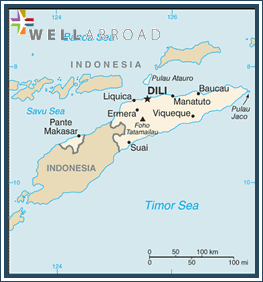|
MOST RECENT ALERTS
There's no recent alert.
|

|
|||||||||||||||
| COUNTRY OVERVIEW | ||||||||||||||||
|---|---|---|---|---|---|---|---|---|---|---|---|---|---|---|---|---|
|
| COUNTRY GENERAL INFORMATION | |||||||
|---|---|---|---|---|---|---|---|
| Language: |
Tetum (official), Portuguese (official), Indonesian, English |
||||||
| Currency: | US dollar (USD) | ||||||
| Predominant Religions: |
Roman Catholic 98%, Muslim 1%, Protestant 1% (2005) |
||||||
| National Holidays: | Independence Day, 28 November (1975) | ||||||
| Economic Status: |
In late 1999, about 70% of the economic infrastructure of Timor-Leste was laid waste by Indonesian troops and anti-independence militias. Three hundred thousand people fled westward. Over the next three years a massive international program, manned by 5,000 peacekeepers (8,000 at peak) and 1,300 police officers, led to substantial reconstruction in both urban and rural areas. The mid-2006 outbreak of violence and civil unrest disrupted both private and public sector economic activity and created 100,000 internally displaced persons - about 10 percent of the population. While real non-oil GDP growth in 2006 was negative, the economy probably rebounded in 2007. The underlying economic policy challenge the country faces remains how best to use oil-and-gas wealth to lift the non-oil economy onto a higher growth path and reduce poverty. In late 2007, the new government announced plans aimed at increasing spending, reducing poverty, and improving the country's infrastructure, but it continues to face capacity constraints. In the short term, the government must also address continuing problems related to the crisis of 2006, especially the displaced Timorese. |
||||||
| Security: |
Timor-Leste Defense Force (Forcas de Defesa de Timor-L'este, Falintil (FDTL)): Army, Navy (Armada) |
||||||
| US Presence: | |||||||
| Document Requirements: |
A passport valid for six months beyond the intended date of departure from Timor-Leste is required. Tourist visas are not required prior to arrival, but travelers arriving in Timor-Leste without a visa will need to pay a $30 fee for a 30-day tourist visa. There is an additional fee for each 30-day renewal of this visa. Visitors traveling via air must transit Singapore; Darwin, Australia; or Bali, Indonesia en route to Timor-Leste. |
||||||
| Major Airports: |
Airports: 8, Airports w/paved runways: 3
|
||||||
| Servicing Airlines: |
|
||||||
| Risks and Precautions: |
American citizens in Timor-Leste should exercise caution, use common sense, avoid large gatherings, remain alert with regard to their personal security, and avoid travel after dark to the extent possible. Americans should exercise caution in public places, including, but not limited to, clubs, restaurants, bars, schools, places of worship, outdoor recreational events, hotels, resorts and beaches and other locations frequented by foreigners. Crimes such as pick pocketing, purse snatchings, residential and automobile break-ins and theft occurs throughout the country, but are more frequent in Dili, the capital. Victims who resist may be subject to physical violence. Gang related violence occurs, and has targeted foreign nationals. Stone-throwing attacks on vehicles occur during periods of gang conflicts and civil unrest, and have resulted in serious injury and death. Visitors should avoid travel at night or in unfamiliar areas alone. Women should avoid traveling alone, especially at night because sexual assault or banditry is possible. Timor-Leste is a socially conservative country, and travelers should avoid wearing revealing clothing, particularly in crowded public areas such as markets. All traffic operates on the left side of the road, and most vehicles use right-hand drive. During the rainy season, travel on all cross-island roadways should be considered to be risky. US citizens should use caution when traveling on the cross-island roadways in the mountain areas of Aileu, Ermera, Manatuto, Ainaro and Manufahi provinces. In December 2003, rain showers severely damaged several cross-island roadways, and several UN vehicles had to be airlifted out of the area south of Aileu due to landslides and roadway damage. |
||||||
| Mortality Statistics: |
Infant MR total: 41.98 deaths/1,000 live births |
||||||
| Immunization Indicators: |
Required: None |
||||||
| Infectious Disease Concerns: |
degree of risk: high
|
||||||
| Overall Quality of Medical Services: |
Although limited emergency medical care is available in Dili, options for routine medical care throughout the country are extremely limited. Serious medical problems requiring hospitalization and/or medical evacuation to Australia, the nearest point with acceptable medical care, to Singapore, or to the United States, can cost thousands of dollars.
|
||||||
| Providers in Network: |
|
||||||
| Recent Medical Threats/ Concerns/Warnings: |
Highly pathogenic avian influenza (H5N1) continues to cause outbreaks in domestic and wild bird populations and has caused human cases in several countries in Southeast Asia. In 2006, the virus continued to spread in poultry populations in Indonesia. Avoid all direct contact with birds, including domestic poultry (such as chickens and ducks) and wild birds, and avoid places such as poultry farms and bird markets where live birds are raised or kept. For a current list of countries reporting outbreaks of H5N1 among poultry and/or wild birds, view updates from the World Organization for Animal Health (OIE), and for total numbers of confirmed human cases of H5N1 virus by country see the World Health Organization (WHO) Avian Influenza website. |
||||||
| Communications Info: |
Country Code: +670 |
||||||






